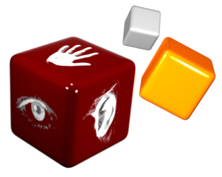

About Faculty Curriculum Facilities SOPA Events Pre-2018 DISIS Events Portfolio Pre-2014 Portfolio L2Ork Directions Contact • • • SOPA ICAT Creativity+Innovation Linuxaudio.org • • •
--Wassily Kandinsky IMPORTANT! Please note that the syllabus is subject to change. Should such a change occur, it will be announced in the Latest Updates section and/or the course mailing list. For this reason, you are strongly encouraged to check this site frequently for changes. Last Updated Computer Music & Multimedia Design Syllabus (MUS3066, MUS5984 graduate course)
Course Objectives In this course we will explore interactivity and its ability to bridge different modalities. We will study real-time digital signal processing techniques with particular focus on sound and visuals, seek deeper understanding of algorithmic approach to content creation and manipulation, interactivity, as well as introduction to video and 3D content design and integration utilizing Cycling 74's Max/MSP/Jitter and pd-l2ork visual rapid prototyping programming environments specifically designed to provide easier access to non-programmers and yet do so without sacrificing the depth or flexibility of traditional programming environments. By the end of the spring semester, participating students will attain a solid foundation in utilizing Max/MSP/Jitter and pd-l2ork for various multimedia-oriented tasks, including interactive multimedia composition, installation art, gaming, as well as the design and development of interactive embedded systems using Raspberry Pi and Arduino. Course Overview
As the semester progresses, we will continue our shift away from "technical" and towards "creative," spending more and more time on discussion, listening, structure and analysis, as well as practical uses of the newly acquired knowledge. Evaluation and Grading
Your grade will consist solely of creative assignments utilizing various software. There will be three smaller assignments (exercises), and a final project. Apart from the technical aspect, the final project will contain a strong creative component. There will be also homework assigned as needed, usually on a weekly basis. Its purpose will be to encourage students to use software consistently. Max/MSP/Jitter and pd-l2ork, just like any other language is best learned through use. IMPORTANT! All graded late assignments will be assessed 10% grade penalty for every day they are late (e.g. an assignment that is 2 days late will be assessed a 20% grade penalty). Please note this penalty will be assessed per each calendar day, not per each class the assignment is late.
Please note that you will not be required to purchase any software for this class as all of the aforesaid software will be available on the workstations in the new studio. Furthermore, pd-l2ork is completely free software. Should you decide, however, to purchase your own personal copy, please talk to me prior to doing so as multiple licenses purchased simultaneously (i.e. by more than one student) may generate significant discounts.
IMPORTANT! Please note that some of the software used in this class may be available as demo that will expire after a preset amount of time. Once such software expires, it will become either partially functional or inaccessible. Either way, it will be student's responsibility to keep track of this particular issue and as such, this limitation will not be viewed as a valid excuse for belated submission of assignments. Accommodations Course Calendar
Please make note of the calendar with important dates listed on the registrar's webiste and plan accordingly. The registrar's calendar can be found here. Assignments Files
|
|